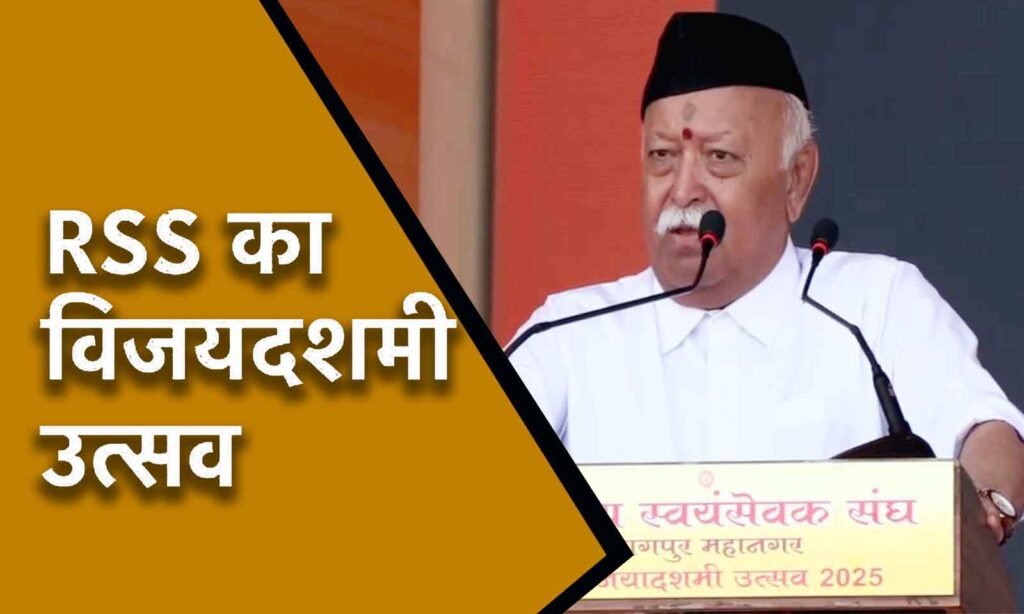In his centenary-year Vijayadashami address, RSS chief Mohan Bhagwat called on hardliners to refrain from divisive shows of strength, urged respect for all faiths, and highlighted India’s need for self-reliance amid global trade challenges.
The Vijayadashami address of the Rashtriya Swayamsevak Sangh has, for nearly a century, served as the ideological compass of the organisation and, by extension, a touchstone for much of India’s cultural and political life. In 2025, as the RSS marked its hundredth year since its founding in Nagpur by Dr. K.B. Hedgewar, Sarsanghchalak Mohan Bhagwat used the occasion to issue a message that was at once unifying and cautionary. His words, “We are one society,” set the tone for a speech that balanced warnings to hardliners with calls for national resilience through tariffs, self-reliance, and social harmony.
This year’s address was closely watched, not only because it coincided with the organisation’s centenary but also because it came in a moment of global economic turbulence and domestic political debates. Donald Trump’s description of India as a “dead economy” had reignited conversations about the country’s growth trajectory, while Prime Minister Narendra Modi’s call in Varanasi to “sell only Swadeshi goods” placed fresh emphasis on economic nationalism. Against this backdrop, Bhagwat’s appeal carried both immediacy and long-term vision.
A Call for Restraint and Unity
The defining thread of Bhagwat’s address was his caution to hardliners within the broader ideological family. Without naming groups or incidents, he warned that provocative demonstrations of strength aimed at intimidating communities would not be tolerated. Strength, he reminded the audience, is meant for protection and service, not for provocation or fear-mongering.
Sometimes, either to elicit a particular reaction or provoke a specific community, a show of strength is organised in a planned manner. The consequences of falling into their trap are not good, either in the short term or long term. It is necessary to curb these tendencies.”
The phrase “We are one society” echoed repeatedly as he stressed that India’s diversity of faiths, languages, and regions must not be misused as grounds for division. At a time when debates around caste census, reservations, and religious polarisation dominate the national conversation, his call for unity resonated as both a moral directive and a political signal.
Diversity as Strength, Not Division
The RSS chief framed India’s social fabric as a mosaic of lifestyles, languages, castes, and faiths, which he described as the nation’s strength rather than its weakness.
We consider our diversities as our individual specialties and also understand the nature of taking pride in our respective uniqueness. However, these specialties should not become a cause of division. Despite all our individual uniqueness, we are all parts of one large society. As a society, a country, a culture, and a nation, we are one. This is our greatest identity and should always be our top priority.”
By invoking unity amid diversity, Bhagwat reiterated the Sangh’s long-standing position that national cohesion is the foundation of India’s rise.
Law, Order, and Social Discipline
Bhagwat placed responsibility not only on the state but also on citizens. While he insisted the administration must act impartially, he underscored the role of ordinary people, particularly the youth, in maintaining harmony.
For small or big matters, or merely due to suspicion in the mind, taking the law into one’s hands, coming out onto the streets, indulging in hooliganism or violence—this tendency is not right.”
The message was both preventative and corrective, urging society to make harmonious conduct its “nature.”
Tariffs, Self-Reliance, and Economic Nationalism
One of the strongest portions of the address was his emphasis on economic sovereignty. Bhagwat warned that blindly following global powers or accepting globalised models without scrutiny would weaken India’s domestic industries. He advocated for what he termed “strategic tariffs,” portraying them not as protectionist barriers but as shields for farmers, workers, and small-scale manufacturers.
This articulation placed him in alignment with Modi’s swadeshi call but also revealed the RSS’s long-standing ideological commitment to self-reliance. Bhagwat argued that true independence extends beyond political freedom into the economic and cultural spheres. For India to become genuinely atmanirbhar, he said, the nation must invest in its own knowledge systems, strengthen indigenous skills, and revive traditions that balance modernity with heritage.
Scientific progress and global trade interconnectedness present opportunities, but the pace of human adaptation is slower. We must therefore be prepared to face the challenges that come with it. Atmanirbhar Bharat is not only a slogan but a necessity.
He added that technologies such as artificial intelligence could empower the country but must be rooted in ethical frameworks drawn from Bharatiya thought, lest India risk becoming a consumer of foreign models rather than a creator of its own.
Mohan Bhagwat’s Vijayadashami address this year combined social caution with economic foresight. His message to hardliners was unambiguous: provocative displays that risk community discord are unacceptable. At the same time, his call for self-reliance amid tariff shocks reflected a forward-looking economic nationalism.
The Broader Centenary Context
The 2025 Vijayadashami address was not delivered in a vacuum. It carried the weight of a hundred years of RSS tradition, beginning with Dr. Hedgewar’s modest gathering of 17 men in Nagpur in 1925. Vijayadashami has always been central to the organisation’s identity, symbolising the triumph of dharma over adharma. For the Sangh, each year’s address is both ritual and road map, setting ideological direction while reaffirming discipline and service as the movement’s core values.
Bhagwat’s call for restraint was particularly significant in this centenary year because it spoke directly to internal debates within the Sangh Parivar. While the RSS projects itself as a cultural and service organisation, elements within the broader ecosystem have sometimes been accused of aggressive mobilisation. By emphasising harmony and restraint, Bhagwat appeared to draw a line, reminding swayamsevaks that social cohesion is more vital than spectacles of strength.
Quotations that Defined the Speech
The address was rich with statements that encapsulated its key themes. His insistence that “we are not Hindus, Muslims, Christians, or Sikhs first — we are Bharatiya first” underscored the emphasis on unity. His declaration that “strength must protect, not provoke” was a direct rebuke to those who misuse power. His insistence that “strategic tariffs are not barriers, they are shields” tied economic nationalism to cultural pride. And his repeated claim that “no caste, no creed, no region can divide us” reinforced the RSS’s attempt to position itself above sectional conflicts.
On Unity:
“We are not Hindus, Muslims, Christians, or Sikhs first — we are Bharatiya first. Our society is one, born of the same soil.”
On Provocation:
“Strength must protect, not provoke. Demonstrations of power that create fear in society weaken our moral fibre.”
On Tariffs:
“Our economic policies must serve the people of Bharat. Strategic tariffs are not barriers, they are shields for our farmers, our workers, and our industries.”
On Self-Reliance:
“True Atmanirbharta is cultural as well as economic. The day we depend fully on our own knowledge, skills, and traditions, we will be truly free.”
On Caste and Division:
“No caste, no creed, no region can divide us. Those who exploit such divisions are enemies of Bharat.”
The Historical Lineage of Vijayadashami Speeches
To appreciate the significance of Bhagwat’s address, it is necessary to place it within the lineage of Vijayadashami messages delivered by his predecessors.
Dr. K.B. Hedgewar (1925–1940)
- 1925: RSS founded on Vijayadashami with 17 young men in Nagpur.
- 1930s: Hedgewar emphasized discipline, character-building, and national service.
- Key Message: “Nation-building begins with the individual swayamsevak.”
When Dr. Hedgewar spoke in the early years, he emphasised discipline and personal character, believing that nation-building began with individual swayamsevaks. His focus was on service and cohesion at a time when India was still under colonial rule.
M.S. Golwalkar (“Guruji”) (1940–1973)
- 1947: Stressed unity during Partition violence, urged swayamsevaks to serve refugees.
- 1962: Called for voluntary participation in India-China war relief.
- Key Message: “RSS is not against any faith, but against forces that divide.”
M.S. Golwalkar, remembered as Guruji, used his speeches to stress unity during periods of upheaval. In 1947, as Partition tore through the subcontinent, he urged swayamsevaks to aid refugees and rise above sectarian divisions. In the 1962 war with China, he called for voluntary national service. His message was that the RSS was not against any faith but against divisive forces.
Balasaheb Deoras (1973–1993)
- 1975: RSS banned during Emergency; Vijayadashami speech called for peaceful resistance.
- 1980s: Addressed Ram Janmabhoomi movement, stressing cultural awakening.
- Key Message: “Cultural renaissance is the foundation of political freedom.”
Balasaheb Deoras, who led the organisation during the Emergency, turned Vijayadashami into a platform for resistance. In 1975, with the RSS banned and thousands of swayamsevaks jailed, his speech was a call for resilience and non-violent defiance. In the 1980s, his addresses increasingly linked the Sangh with the Ram Janmabhoomi movement, framing cultural renaissance as the foundation of political freedom.
K.S. Sudarshan (2000–2009)
- 2001: Advocated economic swadeshi, warning against unchecked globalization.
- 2002: Called for social harmony post-Godhra riots.
- Key Message: “India must modernize without losing its roots.”
K.S. Sudarshan carried forward the theme of swadeshi in the early 2000s, warning against unchecked globalisation. After the 2002 riots in Gujarat, he used his speech to call for reconciliation and social harmony, demonstrating that the Vijayadashami platform often served as a balancing voice within turbulent times.
Mohan Bhagwat (2009–Present)
- 2014: Called Modi’s victory a “mandate for change,” but reminded swayamsevaks that RSS is not partisan.
- 2017: Spoke on cow protection, but warned against violence in its name.
- 2020: During COVID-19, emphasized self-reliance and service.
- 2023: Criticized attempts to divide Hindus on caste lines.
- 2025: Urged restraint, warned against provocative strength displays, and stressed tariffs and self-reliance.
Since 2009, Mohan Bhagwat has reshaped the annual address into both a moral sermon and a subtle commentary on national politics. In 2014, following Modi’s electoral victory, he reminded swayamsevaks that the RSS was not partisan even as it celebrated the change. In 2017, he addressed cow protection, stressing that violence in its name was unacceptable. In 2020, amid the pandemic, his focus shifted to service and self-reliance. In 2023, he confronted caste divisions, warning against those who sought to split Hindu society. And in 2025, the centenary year, he placed restraint, tariffs, and swadeshi at the heart of his message.
A Century of RSS Evolution
The centenary allowed the Sangh to reflect on its journey. From Hedgewar’s disciplined cadre-building to Golwalkar’s philosophical expansion, from Deoras’s political engagements to Sudarshan’s economic critiques, and now Bhagwat’s attempt to balance tradition with modern challenges, Vijayadashami speeches have acted as yearly markers of the organisation’s evolution. Each era has responded to the crises and opportunities of its time, and each speech has carried themes that outlived the moment of delivery.
Mohan Bhagwat’s 2025 Vijayadashami speech stands out as a centenary manifesto that balances caution with vision. By warning hardliners against provocative displays of strength, he sought to curb elements that could inflame communal tensions, while simultaneously emphasizing social unity with his repeated assertion that “we are one society.” His advocacy for economic sovereignty through strategic tariffs and swadeshi reflects both alignment with contemporary government priorities and a longer-standing ideological commitment. At the same time, Bhagwat projected India’s global role, noting that the nation’s progress benefits not only itself but the wider world, signaling the RSS’s ambition to position India as a civilizational guide. Taken together, the speech underscores restraint, self-reliance, and harmony as pillars for India’s centenary-era trajectory, positioning the RSS’s vision of unity, economic empowerment, and cultural strength at the center of national discourse.


